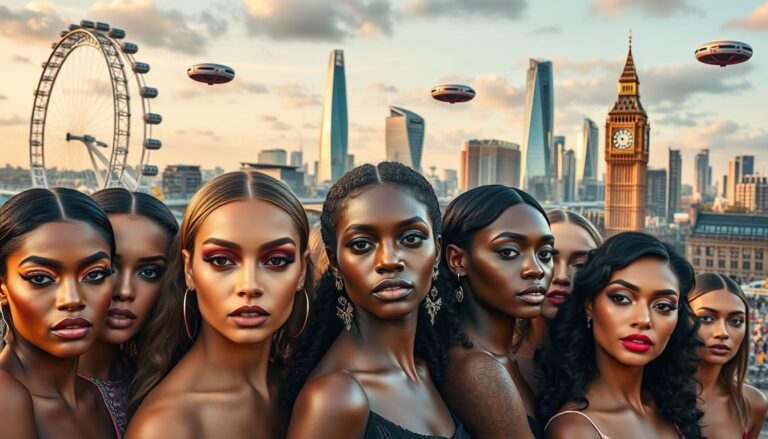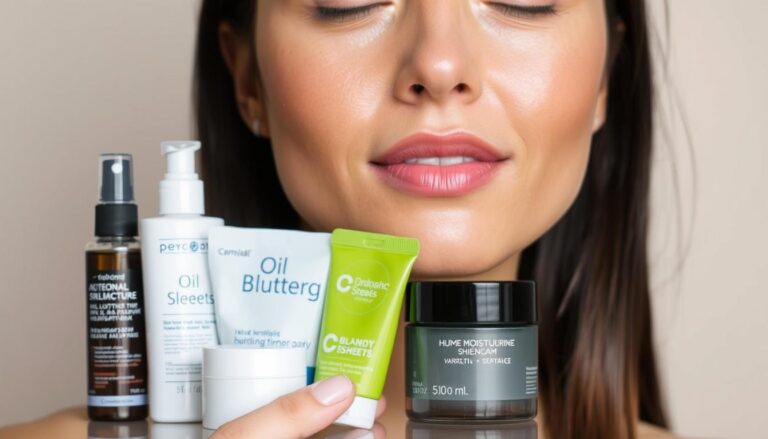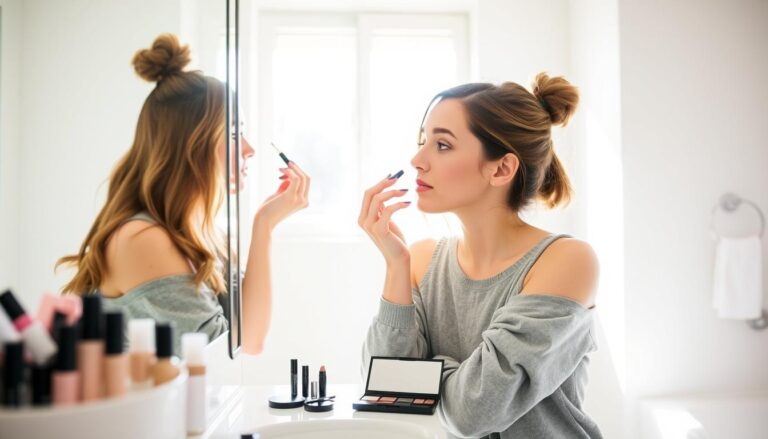At Glowskinhub.com, we believe beauty isn’t just a look—it’s a feeling
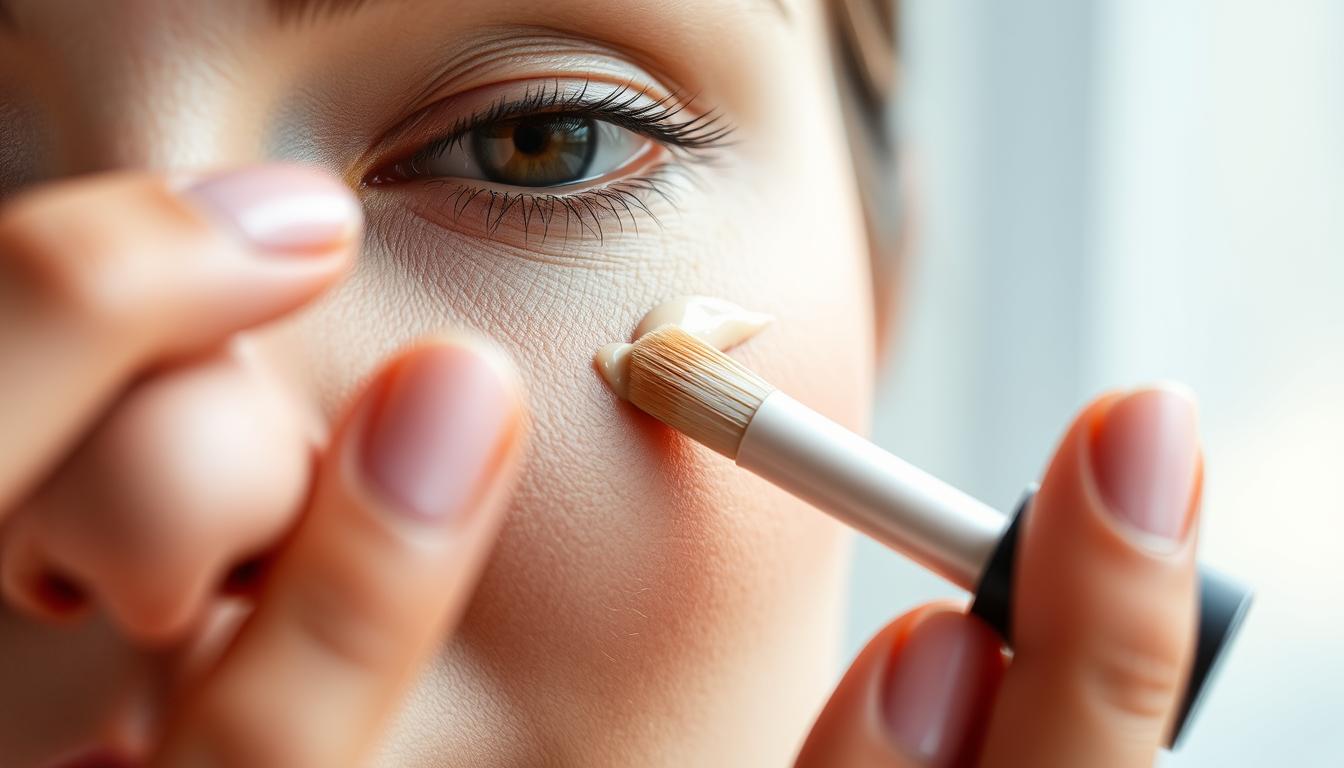
How to apply concealer for dark circles
Dark circles under the eyes can be a persistent issue, affecting one’s appearance and confidence. Effective concealer application is key to achieving a bright-eyed look.
Using the right techniques and products can make a significant difference. A well-applied concealer can transform your look, making you appear more rested and refreshed.
Key Takeaways
- Choose a concealer that matches your Skin tone.
- Apply concealer with a gentle, patting motion.
- Less is more; start with a small amount.
- Blend, blend, blend for a seamless finish.
- Set your concealer with a light dusting of powder.
Understanding Dark Circles: Causes and Types
Understanding the causes and types of dark circles is crucial for effective concealment and treatment. Dark circles are a common cosmetic concern that can affect anyone, regardless of age or Skin type.
Common Causes of Dark Circles
Dark circles can be caused by a variety of factors, including genetics, lifestyle choices, and Skin type. For instance, individuals with oily Skin may experience dark circles due to the increased visibility of blood vessels beneath the Skin. Other common causes include:
- Lack of sleep or poor sleep quality
- Allergies or sinus issues
- Poor diet or dehydration
- Aging or Skin thinning
For those with oily Skin, incorporating oily Skin care tips into their daily routine can help mitigate the appearance of dark circles.
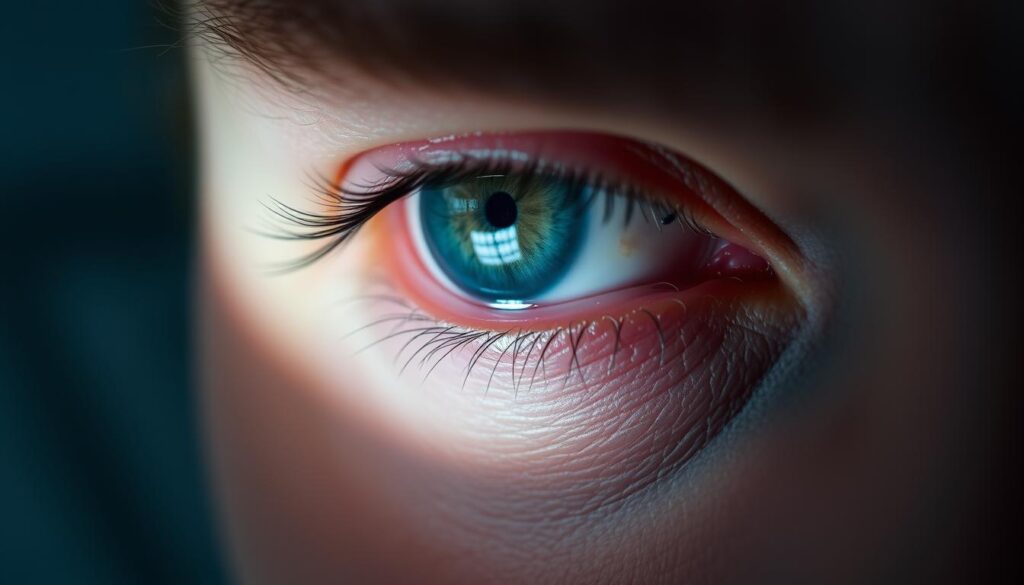
Different Types of Dark Circles
Dark circles can be categorised into different types based on their appearance and causes. The main types include:
- Pigmented dark circles: Caused by an excess of melanin in the Skin.
- Vascular dark circles: Resulting from visible blood vessels under the Skin.
- Structural dark circles: Caused by factors such as tear troughs or loss of fat and collagen.
Identifying the type of dark circles you have is essential for choosing the right treatment or concealment strategy.
Essential Preparation Before Applying Concealer
Effective concealer application starts with a well-prepared under-eye area. Proper preparation ensures that the concealer adheres well and lasts longer, providing a smoother and more natural finish.
Skincare Steps for Under-Eye Area
For individuals with oily Skin, maintaining a consistent skincare routine is crucial. Begin by cleansing the under-eye area gently with a mild cleanser, followed by a toner to balance the Skin’s pH. Apply a lightweight, oil-free moisturizer to hydrate the area without clogging pores.
Using an eye cream rich in antioxidants and peptides can help reduce the appearance of dark circles and puffiness. Gently pat the cream under the eyes with your ring finger, as this area is delicate and requires gentle care.
Tools and Products You’ll Need
To apply concealer effectively, you’ll need a few essential tools and products. These include:
- A concealer that matches your Skin tone or is one shade lighter
- A small, precise concealer brush or a Beauty blender
- A mirror, preferably with good lighting
- A primer specifically designed for the under-eye area
Here’s a simple table outlining the basic products needed:
| Product | Purpose |
|---|---|
| Concealer | To cover dark circles |
| Concealer Brush or Beauty Blender | For precise application |
| Primer | To prepare the Skin for concealer |
| Eye Cream | To reduce puffiness and dark circles |
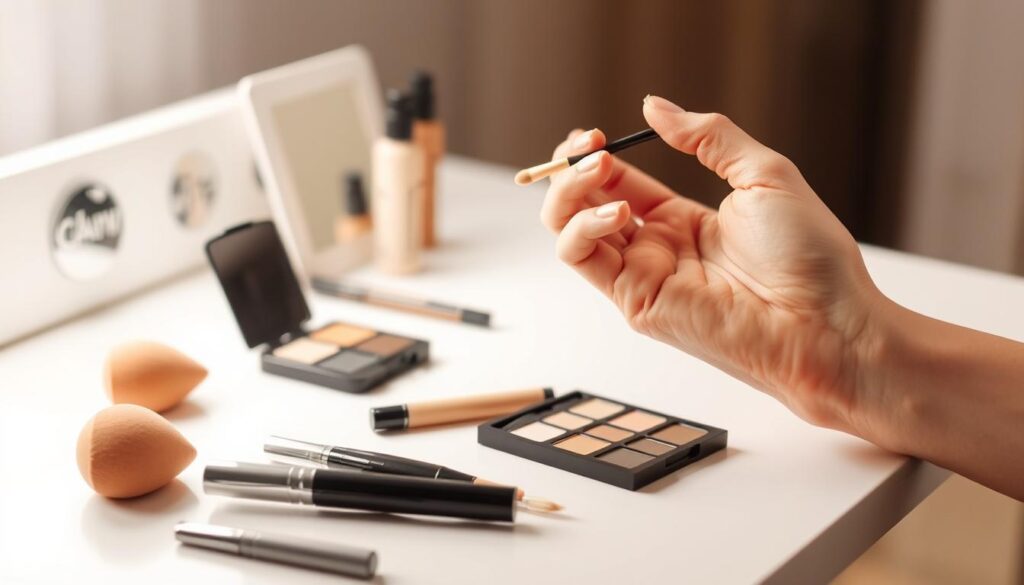
Choosing the Right Concealer for Dark Circles
The quest for the perfect concealer involves understanding colour correction, shade selection, and the right formulation for your Skin. Dark circles can be particularly challenging to conceal, but with the right approach, it’s achievable.
Understanding Colour Correction Principles
Colour correction is a crucial step in effectively concealing dark circles. The principle behind colour correction is to use a colour that is opposite to the colour of the dark circles on the colour wheel. For instance, if your dark circles have a bluish tint, a concealer with a yellow or orange undertone can help neutralize them.
“Colour correction is not just about covering the dark circles; it’s about making them invisible,” says a renowned makeup artist. This technique requires a good understanding of the colour wheel and the undertones of your dark circles.
| Dark Circle Undertone | Colour Corrector |
|---|---|
| Blue | Yellow/Orange |
| Purple | Yellow |
| Green | Red |
Selecting the Perfect Shade for Your Skin Tone
Selecting a concealer that matches your Skin tone is vital for a natural look. For individuals with oily Skin, it’s also important to choose a concealer that is labeled “oil-free” or “non-comedogenic” to avoid clogging pores. When testing concealers, apply a small amount to the under-eye area and observe how it looks in natural light.
For oily Skin, products that are designed for oily Skin or are labeled as “matte” can help control shine and provide a longer-lasting finish. Incorporating skincare for oily Skin into your routine can also help in achieving a smoother canvas for concealer application.
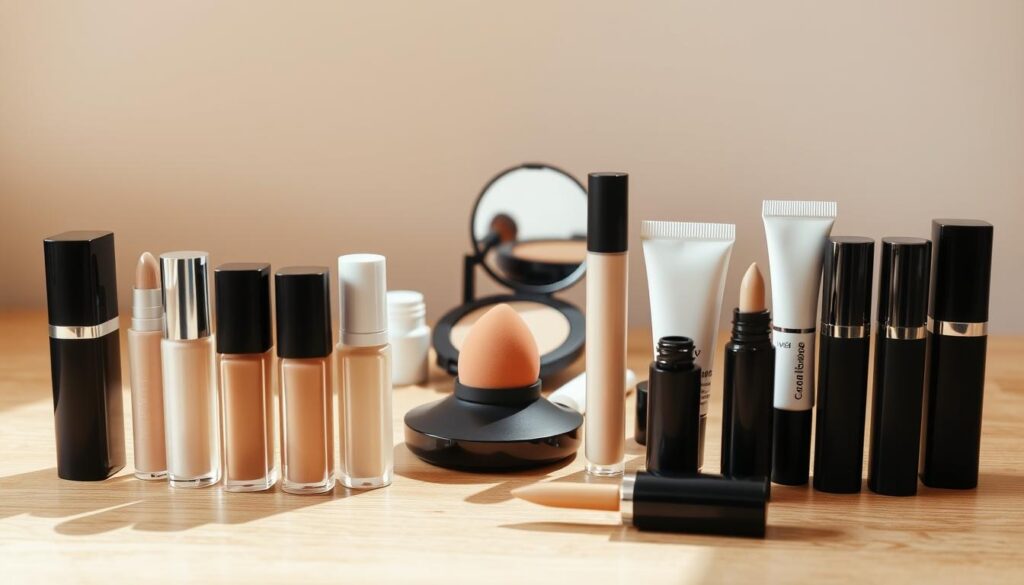
Different Concealer Formulations and Their Benefits
Concealers come in various formulations, including liquid, cream, and stick. Liquid concealers are often preferred for under-eye application due to their ease of blending and natural finish. Cream concealers offer more coverage and are suitable for darker dark circles. Stick concealers are convenient for targeted application.
- Liquid concealers: Easy to blend, natural finish
- Cream concealers: High coverage, suitable for darker dark circles
- Stick concealers: Convenient, targeted application
By understanding these aspects, you can choose a concealer that not only covers your dark circles effectively but also complements your Skin type, whether it’s oily or dry.
How to Apply Concealer for Dark Circles: Step-by-Step Guide
Concealing dark circles effectively requires a strategic approach and the right techniques. By following a simple step-by-step guide, you can achieve a flawless under-eye area that looks natural and lasts throughout the day.
Prepping the Under-Eye Area
Before applying concealer, it’s essential to prep the under-eye area. Start by incorporating an oily Skin regimen that includes gentle cleansing and moisturizing to create a smooth canvas for concealer application.
Use a hydrating eye cream to help reduce the appearance of fine lines and wrinkles, making it easier to apply concealer.
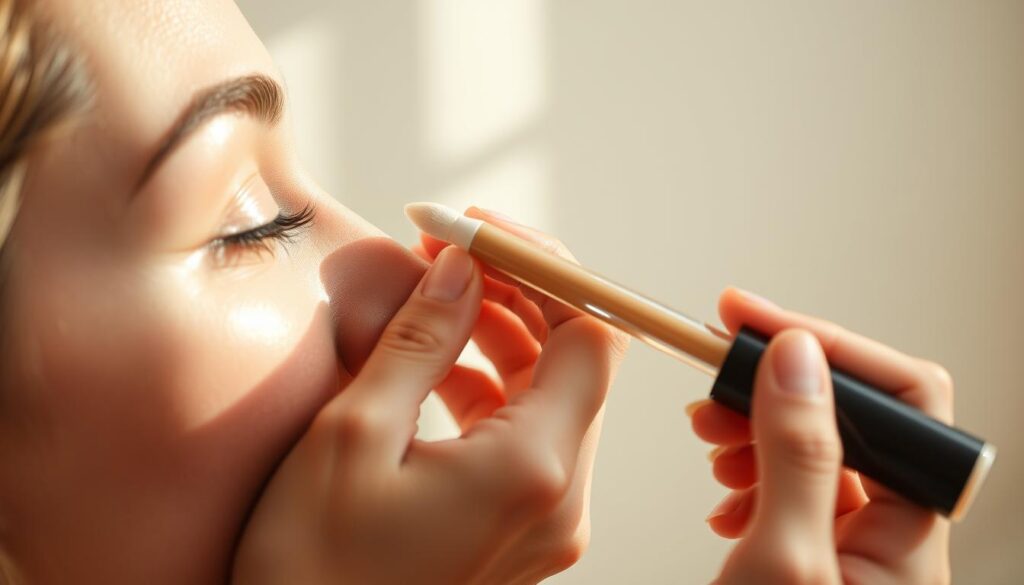
Application Techniques for Different Concealer Types
Different concealer types require different application techniques. For liquid concealers, use a small concealer brush or a Beauty blender to apply a small amount of product to the under-eye area.
For stick concealers, apply the product directly to the dark circles and blend outwards using a gentle patting motion.
For creamy concealers, use a concealer brush to apply the product, starting from the inner corner and working outwards.
Blending Methods for a Natural Finish
Blending is crucial for a natural finish. Use a gentle patting motion with your ring finger to blend the concealer into the Skin.
For a more precise blend, use a Beauty blender or a small concealer brush to ensure a seamless finish.
By following these steps and using the right techniques, you can achieve a flawless under-eye area that looks natural and lasts throughout the day.
Professional Application Techniques for Stubborn Dark Circles
Tackling dark circles effectively involves understanding and applying advanced concealer techniques. For individuals with stubborn dark circles, standard concealer application may not be sufficient. Thus, professional techniques become essential.
The Triangle Method
The triangle method is a highly effective technique for concealing dark circles. It involves applying concealer in a triangular shape under the eyes. This method ensures coverage of the entire under-eye area, providing a more even tone.
Layering Technique for Maximum Coverage
Layering concealer is another technique that provides maximum coverage. Start with a thin layer and gradually build up as needed. This approach helps prevent cakey makeup, ensuring a natural finish. When choosing a concealer, especially for oily Skin, consider best products for oily Skin that are oil-free or matte finish.
Using Colour Correctors with Concealer
Colour correctors can be used in conjunction with concealer to enhance the effectiveness of the coverage. For dark circles, peach or orange correctors are often used. These colours counteract the bluish tone of dark circles, making them less visible.
For best results, consider the following tips:
- Choose a concealer that matches your Skin tone.
- Use a colour corrector if necessary.
- Apply concealer using the triangle method or layering technique.
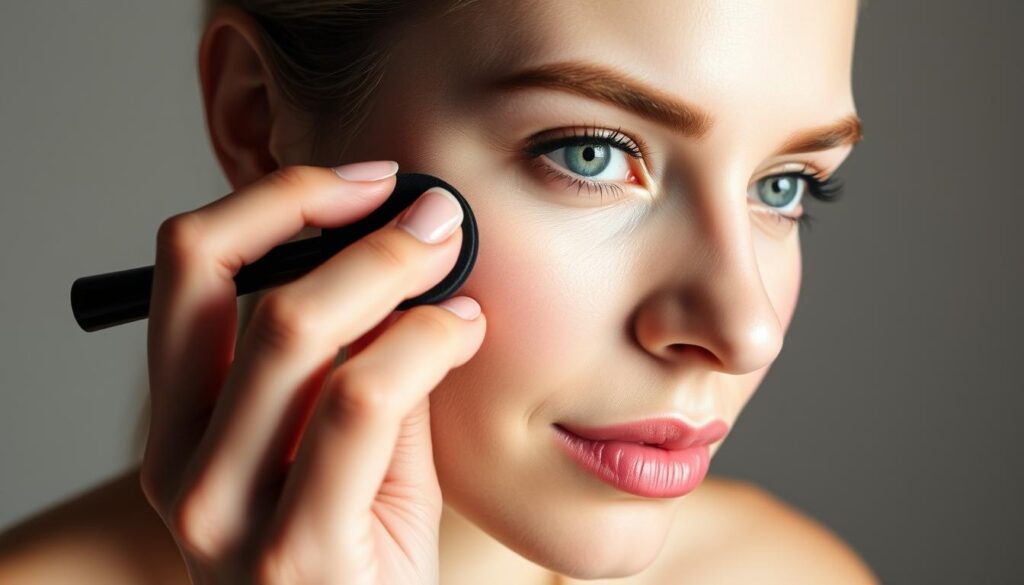
By applying these professional techniques, individuals can effectively conceal stubborn dark circles. Remember, the key is to blend well and build coverage gradually.
Setting Your Concealer for Long-Lasting Results
A well-set concealer can make all the difference in your makeup look, lasting throughout the day without creasing, even on oily Skin that’s been properly moisturized. To achieve this, it’s essential to understand the best methods for setting your concealer.
Powder vs. Setting Spray: Which Works Best?
When it comes to setting concealer, there are two popular options: powder and setting spray. For individuals with oily Skin, using a lightweight, oil-control powder can be effective in absorbing excess oil and preventing creasing. On the other hand, a setting spray can help keep your concealer in place without adding extra product weight, which is beneficial for those with sensitive Skin. If you have oily Skin, consider using an oily Skin moisturizer before applying concealer to ensure your Skin is hydrated but not too oily.

Techniques to Prevent Creasing and Caking
To prevent creasing and caking, it’s crucial to apply concealer sparingly and blend well. Using a gentle patting motion with your ring finger can help blend the concealer into the Skin without pulling or dragging. Additionally, setting your concealer with a powder or setting spray immediately after application can help it last longer. For oily Skin, consider using a mattifying setting spray to control shine throughout the day.
Another technique is to use a concealer that is specifically designed for the under-eye area and is formulated for your Skin type. This, combined with the right application and setting technique, can significantly reduce the appearance of creasing and caking.
Common Mistakes to Avoid When Concealing Dark Circles
Achieving a flawless finish when concealing dark circles requires avoiding several common pitfalls. Many individuals struggle with concealing dark circles effectively, often due to simple mistakes that can be easily avoided with the right techniques and product choices.
Using Too Much Product
One of the most common mistakes is applying too much concealer. This can lead to a cakey, unnatural finish that accentuates rather than conceals dark circles. Start with a light hand and build coverage gradually. This approach ensures a more natural look and prevents the concealer from settling into fine lines.
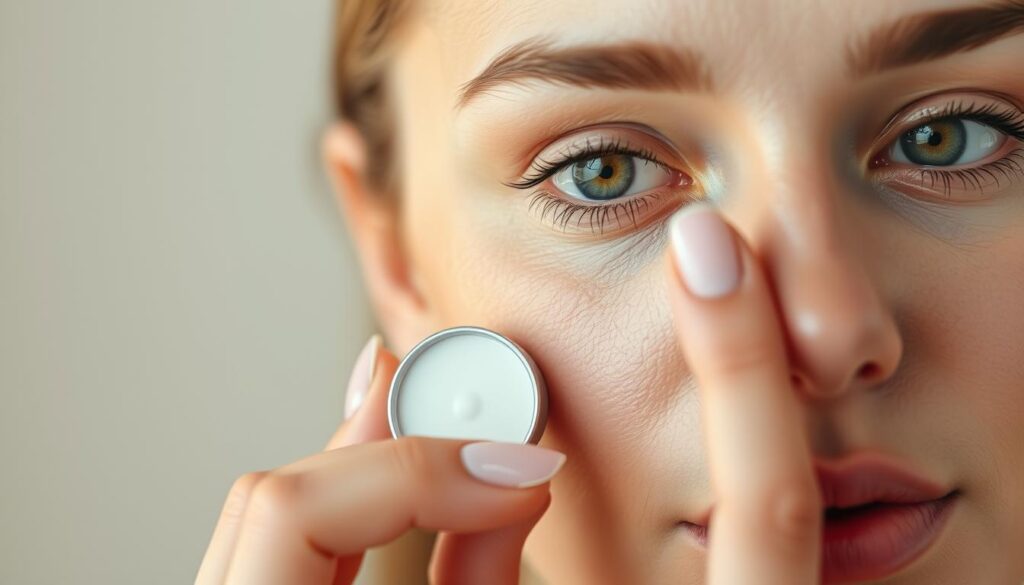
Choosing the Wrong Shade or Formula
Selecting the right shade and formula is crucial. A concealer that is too light or too dark can draw attention to dark circles rather than hiding them. For individuals with oily Skin, choosing a concealer that is oil-free or specifically designed for oily Skin treatment can help prevent creasing and ensure a longer-lasting finish. Colour correction principles can also guide the selection of the right shade, helping to neutralize the appearance of dark circles.
“The right shade of concealer can make all the difference in achieving a natural look.”
Improper Application Techniques
Improper application techniques can also detract from the effectiveness of concealer. Using the wrong tools or applying concealer in the wrong area can lead to an uneven finish. Gently pat the concealer into the Skin with your ring finger, starting from the inner corner and working your way outward. This technique helps to distribute the product evenly and prevents pulling or tugging on the delicate Skin under the eyes.
By avoiding these common mistakes, individuals can achieve a more flawless and natural finish when concealing dark circles. Whether you’re dealing with dark circles due to lack of sleep, genetics, or other factors, the right techniques and products can make a significant difference.
Top UK Concealer Brands for Dark Circles
The UK market offers a wide range of concealers for dark circles, catering to various needs and budgets. Whether you’re looking for a high-end product or a budget-friendly alternative, there’s something for everyone.
High-End Options Available in the UK
For those willing to invest in premium products, brands like Estee Lauder and Christian Dior offer high-quality concealers. Their products, such as the Estee Lauder Double Wear Concealer and Dior Diorskin Concealer, are known for their excellent coverage and long-lasting wear.
Budget-Friendly Alternatives from UK Retailers
Not everyone needs to break the bank to get a good concealer. Brands like Maybelline and L’Oreal offer affordable yet effective concealers. The Maybelline Instant Age Rewind Eraser and L’Oreal True Match Concealer are popular choices among UK consumers.
Cult Favourites Among British Makeup Artists
Makeup artists in the UK often swear by certain concealers. NARS Radiant Creamy Concealer is a cult favourite due to its creamy texture and excellent coverage. Another popular choice is the Hourglass Concealer, known for its high coverage and natural finish.
| Brand | Product | Price Range |
|---|---|---|
| Estee Lauder | Double Wear Concealer | £25-£30 |
| Maybelline | Instant Age Rewind Eraser | £8-£12 |
| NARS | Radiant Creamy Concealer | £20-£25 |
Conclusion: Achieving Bright, Well-Rested Eyes
Mastering how to apply concealer for dark circles can significantly enhance your morning Beauty routine, giving you a bright-eyed look that boosts your confidence. By understanding the causes of dark circles and selecting the appropriate concealer, you can effectively camouflage this common concern.
Proper preparation of the under-eye area, coupled with the right application techniques, ensures a seamless finish. Whether you opt for high-end options from top UK brands or budget-friendly alternatives, the key to a successful application lies in blending the concealer well and setting it for long-lasting results.
With practice, you can achieve a bright-eyed look that makes you appear well-rested and refreshed. By avoiding common mistakes and using the right products, you’ll be well on your way to mastering the art of concealing dark circles, resulting in a smoother, more even-toned under-eye area.

